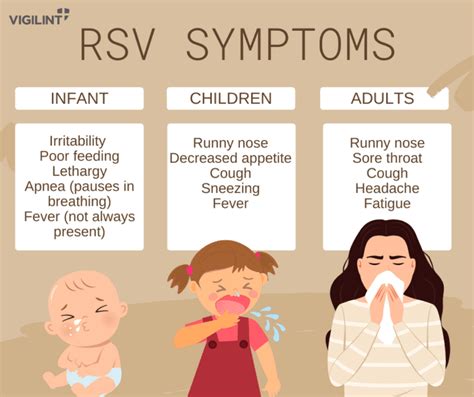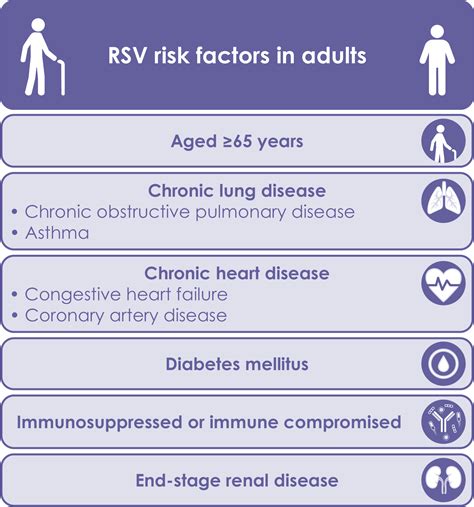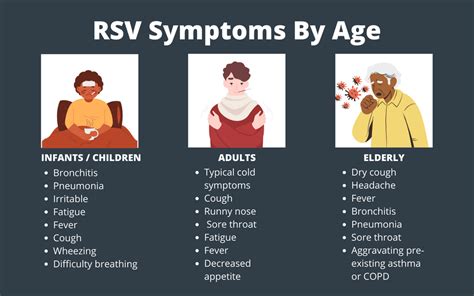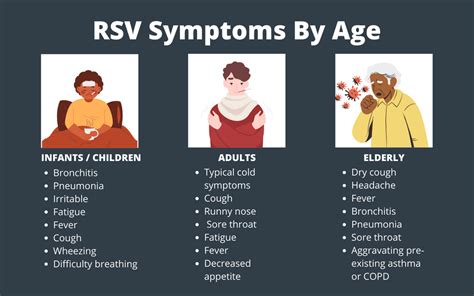Intro
Learn about Adult RSV symptoms, diagnosis, and treatment. Discover respiratory syncytial virus signs, prevention, and management in adults, including older adults and those with weakened immunity.
Respiratory syncytial virus (RSV) is a common and highly contagious virus that affects people of all ages. While it is often associated with young children, RSV can also cause significant illness in adults, particularly those with weakened immune systems or underlying health conditions. Adult RSV symptoms can range from mild to severe and may resemble those of other respiratory infections, making diagnosis and treatment challenging.
RSV is a major public health concern, as it is a leading cause of respiratory illness in older adults and those with compromised immune systems. According to the Centers for Disease Control and Prevention (CDC), RSV infects nearly 2 million adults aged 65 and older in the United States each year, resulting in approximately 180,000 hospitalizations and 14,000 deaths. The virus can spread quickly through close contact with an infected person, contaminated surfaces, or respiratory droplets.
Understanding adult RSV symptoms is crucial for prompt recognition, diagnosis, and treatment. Adults with RSV infection may experience a range of symptoms, including runny nose, cough, sore throat, fever, and headache. In more severe cases, RSV can cause pneumonia, bronchiolitis, and other respiratory complications. Certain groups, such as older adults, pregnant women, and individuals with underlying health conditions, are at higher risk of developing severe RSV disease.
Introduction to Adult RSV Symptoms

Adult RSV symptoms can be similar to those of other respiratory infections, such as influenza or COVID-19. However, there are some key differences. RSV typically causes a more gradual onset of symptoms, whereas influenza and COVID-19 can cause a sudden and severe illness. Additionally, RSV is more likely to cause respiratory complications, such as pneumonia and bronchiolitis, in older adults and those with underlying health conditions.
Causes and Risk Factors of Adult RSV Symptoms

The causes of adult RSV symptoms are complex and multifaceted. RSV is a highly contagious virus that can spread through close contact with an infected person, contaminated surfaces, or respiratory droplets. Certain groups, such as older adults, pregnant women, and individuals with underlying health conditions, are at higher risk of developing severe RSV disease. Weakened immune systems, underlying health conditions, and age-related declines in physical function can all contribute to the severity of RSV symptoms.
Underlying Health Conditions
Adults with underlying health conditions, such as heart disease, lung disease, or diabetes, are at higher risk of developing severe RSV disease. These conditions can weaken the immune system, making it more difficult for the body to fight off the virus. Additionally, underlying health conditions can increase the risk of respiratory complications, such as pneumonia and bronchiolitis.Age-Related Declines in Physical Function
Age-related declines in physical function can also contribute to the severity of RSV symptoms. Older adults may experience a decline in immune function, making it more difficult for the body to fight off the virus. Additionally, age-related declines in physical function can increase the risk of respiratory complications, such as pneumonia and bronchiolitis.Symptoms of Adult RSV Infection

The symptoms of adult RSV infection can range from mild to severe and may resemble those of other respiratory infections. Common symptoms include:
- Runny nose
- Cough
- Sore throat
- Fever
- Headache
- Fatigue
- Muscle aches
- Shortness of breath
In more severe cases, RSV can cause pneumonia, bronchiolitis, and other respiratory complications. These complications can be life-threatening, particularly in older adults and those with underlying health conditions.
Mild Symptoms
Mild symptoms of adult RSV infection may include a runny nose, cough, and sore throat. These symptoms can be similar to those of other respiratory infections, such as the common cold or influenza. However, RSV typically causes a more gradual onset of symptoms, whereas influenza and COVID-19 can cause a sudden and severe illness.Severe Symptoms
Severe symptoms of adult RSV infection may include pneumonia, bronchiolitis, and other respiratory complications. These complications can be life-threatening, particularly in older adults and those with underlying health conditions. Severe symptoms may also include:- Shortness of breath
- Chest pain
- Confusion
- Severe headache
- Severe fatigue
Diagnosis and Treatment of Adult RSV Symptoms

Diagnosis of adult RSV symptoms typically involves a physical examination, medical history, and laboratory tests. Laboratory tests may include:
- Rapid antigen detection tests
- PCR (polymerase chain reaction) tests
- Serology tests
Treatment of adult RSV symptoms typically involves supportive care, such as rest, hydration, and medication to relieve symptoms. In more severe cases, hospitalization may be necessary to provide oxygen therapy, mechanical ventilation, and other supportive care.
Supportive Care
Supportive care is the primary treatment for adult RSV symptoms. This may include:- Rest
- Hydration
- Medication to relieve symptoms, such as cough and fever
- Oxygen therapy
- Mechanical ventilation
Antiviral Medications
Antiviral medications, such as ribavirin, may be prescribed to treat severe RSV disease. These medications can help reduce the severity of symptoms and shorten the duration of illness.Vaccination
Vaccination is not currently available for adult RSV infection. However, researchers are working to develop a vaccine to prevent RSV disease in adults.Prevention of Adult RSV Symptoms

Prevention of adult RSV symptoms is crucial to reduce the risk of infection and transmission. The following measures can help prevent adult RSV symptoms:
- Practice good hygiene, such as washing hands frequently and avoiding close contact with infected individuals
- Avoid touching eyes, nose, and mouth
- Clean and disinfect surfaces and objects that may be contaminated with the virus
- Avoid sharing utensils, glasses, and other personal items
- Stay home from work or school if symptoms occur
Good Hygiene
Good hygiene is essential to prevent adult RSV symptoms. This includes:- Washing hands frequently with soap and water
- Avoiding close contact with infected individuals
- Avoiding touching eyes, nose, and mouth
- Cleaning and disinfecting surfaces and objects that may be contaminated with the virus
Respiratory Precautions
Respiratory precautions can help prevent adult RSV symptoms. This includes:- Wearing a mask when in close contact with infected individuals
- Avoiding sharing utensils, glasses, and other personal items
- Staying home from work or school if symptoms occur
What are the symptoms of adult RSV infection?
+The symptoms of adult RSV infection can range from mild to severe and may resemble those of other respiratory infections. Common symptoms include runny nose, cough, sore throat, fever, and headache.
How is adult RSV infection diagnosed?
+Diagnosis of adult RSV infection typically involves a physical examination, medical history, and laboratory tests, such as rapid antigen detection tests, PCR tests, and serology tests.
How is adult RSV infection treated?
+Treatment of adult RSV infection typically involves supportive care, such as rest, hydration, and medication to relieve symptoms. In more severe cases, hospitalization may be necessary to provide oxygen therapy, mechanical ventilation, and other supportive care.
In conclusion, adult RSV symptoms can be a significant public health concern, particularly for older adults and those with underlying health conditions. Understanding the causes, symptoms, diagnosis, treatment, and prevention of adult RSV infection is crucial to reduce the risk of infection and transmission. By practicing good hygiene, avoiding close contact with infected individuals, and staying home from work or school if symptoms occur, adults can help prevent the spread of RSV and reduce the risk of severe disease. If you suspect you or a loved one has adult RSV symptoms, it is essential to seek medical attention promptly to receive proper diagnosis and treatment. We encourage you to share this article with others to raise awareness about adult RSV symptoms and to comment below with any questions or concerns.
